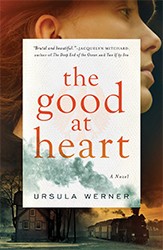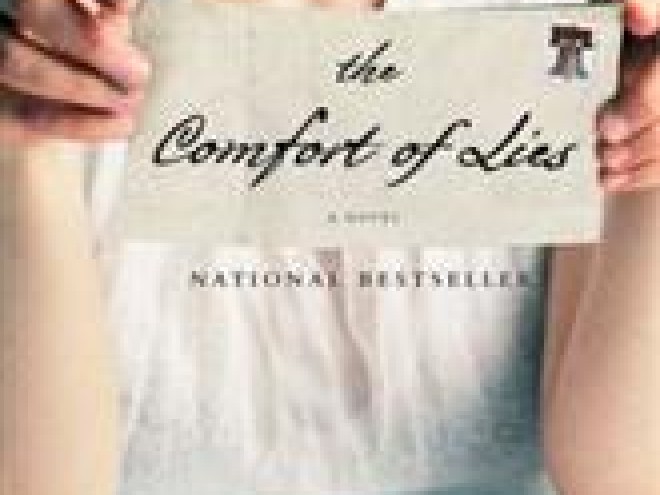
Ursula Werner is the author of novel The Good at Heart, recently released from Touchstone Books. Ursula will be guest blogging for the Jewish Book Council all week as part of the Visiting Scribe series here on The ProsenPeople.
When my sister and I were very young, we loved playing with Linda Leibowitz, the little girl who lived across the street from our house in South Florida. We loved Linda’s tininess, her pale skin and straight, jet-black hair, so different from our own heftier Germanic bodies and wavy manes. Most summers, the three of us swam happily for hours in our pool, but every once in awhile, we fought as only girls can. Inevitably during those times, my sister and I ganged up on poor Linda, until she ran back across the street to her mother, crying and yelling, “I hate you, you dirty Nazis!”
At the time, I honestly did not know what a Nazi was, though I did understand that it had something to do with the fact that we were German and that, whatever it was, it wasn’t good. By the time I learned about the Holocaust at school a few years later, I had learned another, far more painful fact about my heritage: my great-grandfather was a Nazi, and he had worked directly for Hitler.
When I shouldered the burden of cultural guilt that, to some extent, every German feels when he or she learns about the Holocaust, I did so believing that it was an appropriate penance, given the lingering pain suffered by the family members and descendants of those millions who had been incinerated by my national forebears. But that burden was nowhere near as heavy as the millstone of my great-grandfather’s participation in the upper echelons of the Third Reich. I felt compelled to know more about what my great-grandfather knew or didn’t know, what he did or didn’t do. On one hand, I felt it was my duty to confront the reality of my personal history; on the other, I hoped for some kind of personal exoneration. But my parents and grandparents, like so many other survivors of the war, did not want to talk about it.
My novel, The Good at Heart, was to some degree a response to this wall of familial silence. It was my fictional recreation of the world in which my great-grandparents lived, my attempt as a writer to explore the choices they confronted and the dangers they faced. Halfway through writing the novel, on a visit to my aunt’s house in Hamburg I found a pile of letters written on behalf of my great-grandfather when he was jailed in Hamburg in 1946, awaiting “de-Nazification.” These letters told me that he stayed in the Economics Ministry of the Hitler administration consciously and deliberately, so that, as he told one Jewish businessmen in 1935, he might ensure that “the regulations against Jews [were] applied in a very lenient way.” I learned that he used his position to help Jewish individuals whenever possible, that he did not approve of the Nazi program, and that the file the SS kept on him was thicker than an unabridged dictionary.
When I first read these letters four years ago, I felt a kind of relief that I finally had some answers. Over time, that feeling of relief has evolved — first, into profound sense of sadness that someone who was apparently so well-meaning could have been so naïve about the intentions of the government he served. Was it fear or wishful thinking that made him believe that antisemitic regulations were the worst the Third Reich could dish out? I imagine my great-grandfather sitting in his prison in Hamburg, a former concentration camp converted by the Allies into a holding depot for possible war criminals. I imagine he understood the irony of where he was incarcerated, and I wonder how blindsided he felt and to what degree he castigated himself for not seeing the truth of Hitler’s ambitions earlier.
I like to think that, if I were in my great-grandfather’s shoes, I would have done the same things he did. I like to think that I might even have tried to do what my character Marina does in The Good at Heart and sheltered those fleeing the Nazi machine because they were Jews or Poles or members of other “unwanted” groups.
But then I remember that both my great-grandfather and Marina were acting in a police state, where the punishment for opposing the regime meant incarceration or death. And not just for themselves, but for members of their family. I might convince myself that I would have the courage to face my own imprisonment or execution in order to do the right thing, but would I knowingly put my family in danger? My young children? These are questions that make me pause.
Fortunately, however, I do not live in a police state. Fortunately, I live in a country with firmly entrenched democratic values and a Constitutional commitment to the freedom and equality of all people. But I am only recently understanding that the privilege of living in this democracy — more particularly, of enjoying the fruits of its ideals — imposes an affirmative obligation on me, an obligation to act. If my great-grandfather’s experience has anything to teach me, it is that whenever my government engages in morally indefensible actions, I have a responsibility to speak up in opposition. Even if those actions do not directly affect me, even if I have other, seemingly more pressing, matters in my personal life, there is no excuse for silence. My apathy and passivity permit the fire of calculated hatred and systematized prejudice to burn unchecked; I have to act because otherwise, as in my great-grandfather’s time, the fire might rise to a conflagration. I have to act because otherwise, as his example teaches me, there might be far worse to come.
Ursula Werner is a writer and attorney currently living in Washington, DC, with her family. Born in Germany and raised in South Florida, she has practiced law while continuing her creative writing, publishing two books of poetry, In the Silence of the Woodruff (2006) and Rapunzel Revisited (2010). Her first novel, The Good at Heart, was published by Touchstone Books earlier this year.



